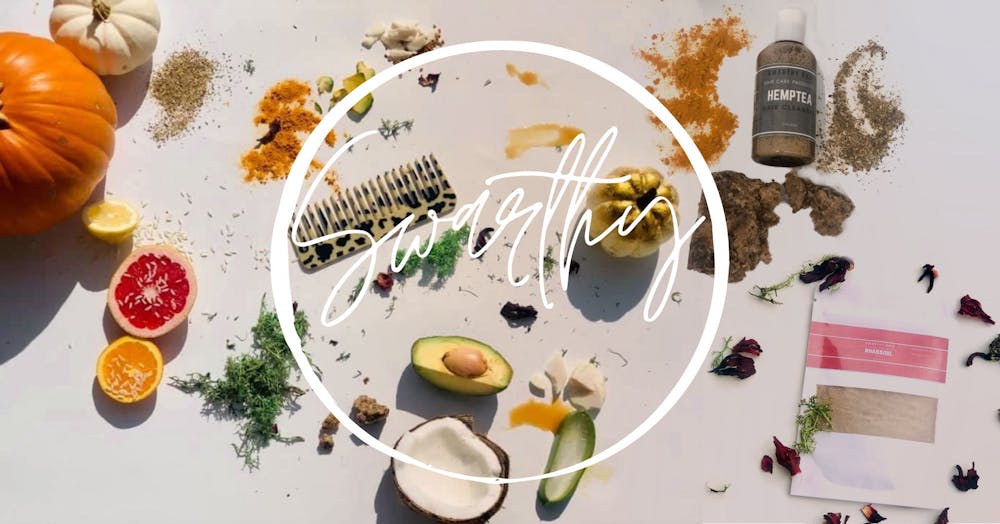After years of struggling to find healthy products for her natural Black hair, Hatdrika Noble-Monroe decided to make her own. She launched Swarthy Hair Co. in November, and the company’s website made over $1,000 and had about 300 visitors on its first night.
Since then, Swarthy Hair has evolved into Swarthy, a community grocery store where Black-owned farms and small businesses can sell their products like fresh produce, haircare, candles, sage and other healthy alternatives.
The store is in its developing stages and doesn’t have a physical location yet. Noble-Monroe started a GoFundMe fundraiser in hopes of encouraging community investment in Swarthy so its future building can undergo renovations.
Noble-Monroe is from East Gainesville and has fond memories of growing up in an area with representation of what it means to be Black, proud and love one’s community.
“It’s embedded in me, and it’s time for me to do something for my community,” she said. “I began to dream about it, and I began to think about what was lacking in my community.”
The quarantine induced by the COVID-19 pandemic led the 27-year-old to spend her days networking with Black women on social media, talking about how they care for their hair.
Noble-Monroe created Swarthy Hair to sell healthy hair care items such as cleansers and masks. Her products quickly gained popularity online as customers reached out to not only try her products but also offer donations.
“People want the knowledge and people want the healthy alternatives, and so this is bigger than just hair — a way for people in our community to gain healthy alternatives and knowledge behind healthy narratives,” Noble-Monroe said.
She expanded her business to a grocery story to supply East Gainesville with economic development and help fight food insecurity.
She hopes to house Swarthy at 1622 NE Eighth Ave, which she said was a well-known Black beauty supply store in the 90s and early 2000s. Noble-Monroe said Eighth Avenue is the heart of East Gainesville, as it was a prime location for Black people and businesses in East Gainesville over 150 years ago. It is also historically known for having Duval Shoe Hospital and housing teachers from Charles W. Duval Elementary, which she said was one of the first Black schools in Gainesville.
Much of East Gainesville qualifies as a food desert, which the United States Department of Agriculture defines as a low-income area where a substantial number of residents have low access to a supermarket or large grocery store.
“It’s a desert, and they’re starving over there physically, emotionally, spiritually and economically,” Noble-Monroe said.
Noble-Monroe has reached out to interested vendors and other community entities like GRACE Grows, a community garden organization that targets homelessness.
Latashia Brimm, the GRACE Grows project coordinator, said the plans for Swarthy coincide with the GRACE Grows community garden outdoor action project. The project received $35,000 in grant money from the USDA at its start, and they engaged community members through a survey gauging their thoughts on how to solve the food desert issue.
“We’re looking for solutions directly from the community, and then we’re going to gather the funding to implement those solutions,” Brimm said.
She said she is looking forward to the collaboration between Swarthy and GRACE Grows, which the city asked to be the community outreach and engagement model for establishing a grocery store in Southeast Gainesville.
Brimm believes GRACE Grows is perfect for this project because it keeps the community involved while having its best interests at heart. She said something like Swarthy is necessary for the community and will help alleviate the stress of not having access to a grocery store.
Noble-Monroe also hopes to have a community garden in the back of the store and create a space where they can host workshops and events on things like meal planning, healthy food, mindfulness and yoga.
She said she wanted to foster a space where Black community members can learn about the racial wealth gap, strengthen local economic development and celebrate Black culture. There’s not a lot of places where Black people dealing with issues of racial disparities and injustice can feel safe, she said.
“We want to really provide a safe haven for people to feel safe and loved on,” Noble-Monroe said. “We want to make people feel like they’re people.”
Chanda Mayes, 45, has lived in East Gainesville her entire life and has seen the lack of resources in the area increase since the ‘80s. She said during her childhood, numerous recreation centers, activities, restaurants and shops existed in the area. But as she raises her own children, she’s seen those resources disappear.
She said this is due to a lack of interest from community leaders and a disconnect among generations that live in East Gainesville, which is why Swarthy is needed.
Reviving the business sector in the region will increase community support, decrease crime and increase opportunity, she said.
“It will not only bring business back to the community, but it will also help the community continue to thrive and grow,” Mayes said.
Contact Lucille Lannigan at llannigan@alligator.org. Follow her on Twitter @lucillelannigan.

Lucy is a senior journalism major and the metro editor for The Alligator. She has previously served as a news assistant and the East Gainesville reporter for the metro desk as well as the health and environment reporter on the university desk. When she’s not doing journalism you can find her painting or spending time outside.






